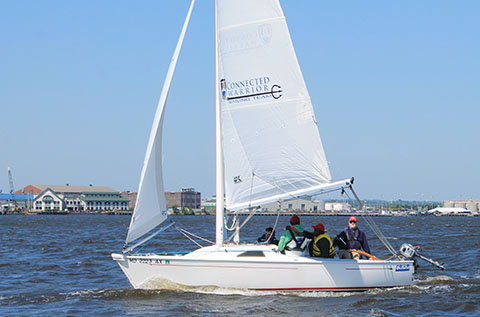Feb. 11, 2018
Look at the face of a wounded warrior or other person with physical challenges who is now able, for the first time, to actually sail a boat on the Chesapeake Bay. Or look at the faces of underprivileged children who have seen not only that there’s a wider world but that one of that world’s great natural wonders is at their doorstep. Researchers may not yet have quantified what’s happening, but the benefits are real enough.
For 27 years, the volunteers of Chesapeake Region Accessible Boating have been bringing such benefits to thousands. The nonprofit sails its small fleet from a pier at Sandy Point State Park. It hosts four regattas a year, has group sails for a wide variety of organizations and provides sailing clinics and “SailFree Sundays” for persons with disabilities and their families and friends. It also works with local police departments to host sailing camps for at-risk youths.
Now Executive Director Paul Bollinger and CRAB’s other leaders are setting out to navigate waters trickier than the open bay. In a meeting with the Capital Gazette editorial board last week, Bollinger aptly likened the challenges of getting funding and approvals from multiple layers of government to “three-dimensional chess.”
Bollinger’s goal is an adaptive boating center in Annapolis; CRAB has a letter of intent to buy an existing marina on Back Creek. Moving operations away from Sandy Point would give the organization space to expand its fleet and store donated boats — and CRAB would no longer be at the mercy of the state park’s early closings and access-road traffic jams. The nonprofit would be able to move its offices to the new facility, have a classroom and offer more services.
All well and good, but the volunteer-reliant CRAB doesn’t have the money to accomplish this by itself. The price of the marina would be something like $2.5 million. Legislation for a bond bill for up to $500,000 is being introduced in the General Assembly by two local legislators — in the Senate by John Astle, a Democrat, and in the House by Herb McMillan, a Republican. The bill would require CRAB to come up with matching funds.
Beyond that, Bollinger and colleagues have their eye on matching grants from the state’s Waterway Improvement Fund and on Program Open Space money, which would ultimately come through the county Department of Recreation and Parks. As Bollinger said, county support will ultimately be the linchpin of the effort.
The organization’s timing is excellent — it’s stepping up lobbying just as its sometimes-partner in hosting regattas, the National Sailing Hall of Fame, is abandoning plans for a physical presence on City Dock. Turning an existing marina into an adaptive boating center would be in line with the Annapolis’ identity as a sailing mecca. And it would compensate for the city’s lack of docks that comply with the Americans with Disabilities Act.
Still, there are always more good causes than available money. We wish CRAB the best with this project — the organization already does a lot for the entire region, and this new facility would allow it to do more. But our guess is that it will need patience, perseverance and a little luck to pull this off.

